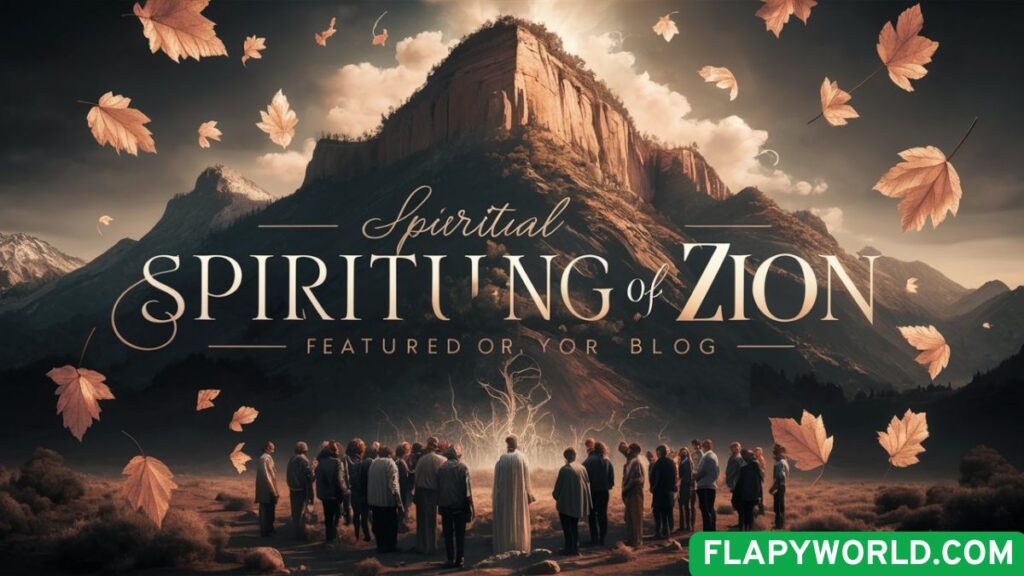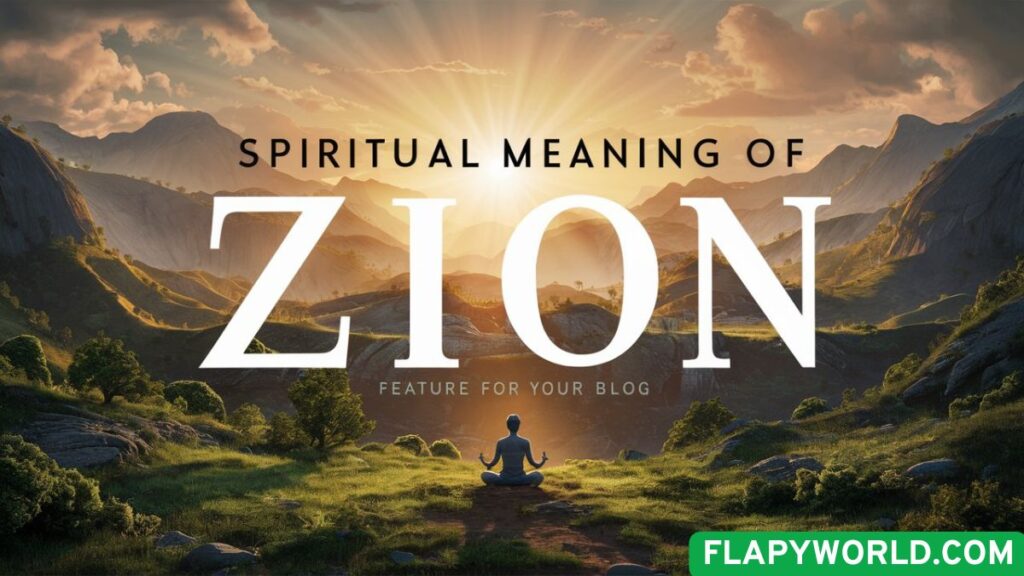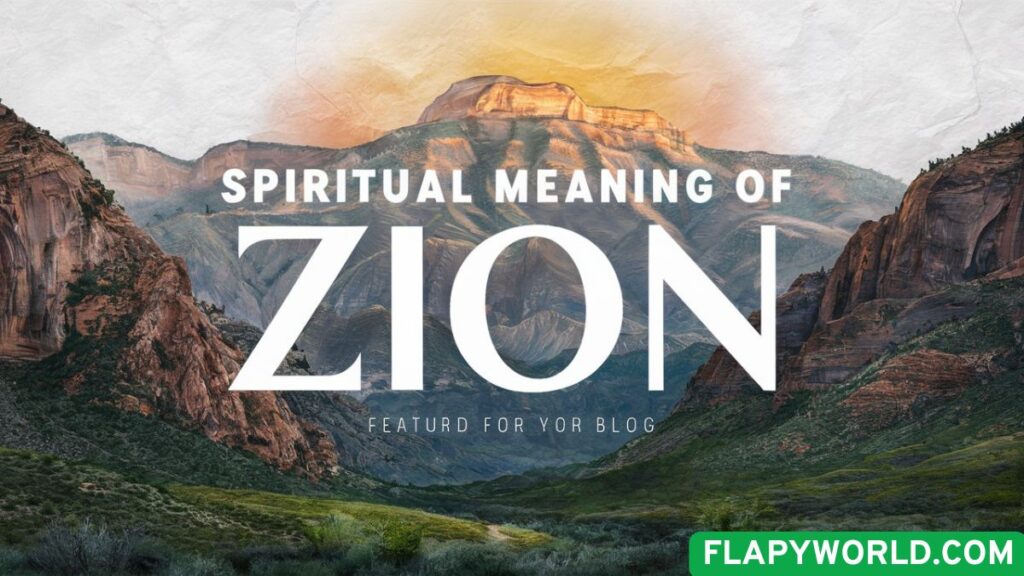The spiritual meaning of Zion is more than a place on a map. In the Bible, Zion is the City of God. It shows His presence, His promise, and His eternal home with His people.
People have always looked to Zion for hope. It’s a symbol of peace and salvation. Zion calls hearts to believe, trust, and wait for God’s kingdom.
The spiritual meaning of Zion touches faith in many ways. In Christianity and Judaism, it shows God’s dwelling place. In prophecy, it points to redemption. For believers, Zion means unity, strength, and eternal life.
Zion in Hebrew
The root of Zion lies in Zion in Hebrew (Tziyon), written as צִיּוֹן. In its earliest form, the word meant a landmark or sign, something fixed and easily recognizable. In modern Hebrew, the root צ-י-ן gives rise to a verb meaning “to point out.” This points to the way Zion always served as more than just a hill—it was a pointer, a beacon that drew people’s attention to God.
The meaning of Zion in the Bible begins as something physical but quickly grows spiritual. For ancient Israel, Mount Zion wasn’t only a location, it became God’s dwelling place, the holy city, and later a metaphor for unity, promise, and eternal life.
Biblical Significance of Zion
The earliest biblical Zion reference is in 2 Samuel 5:7, when David captured the stronghold of the Jebusites. From then on, it became known as the City of David. Yet, the fortress was only the beginning. As the biblical story unfolds, Zion expands to cover Jerusalem, the Temple Mount, and eventually the hope of all Israel.
Zion symbolized God’s covenant with His people. It stood for His protection, His promise, and His plan for redemption. For example, in the Psalms, Zion is celebrated as a place of beauty and strength, while in Isaiah and Jeremiah, Zion becomes both a place of lament and of future restoration.
Mentions of Zion in the Bible
The word Zion appears 152 times in the Old Testament. It shows up in songs, prophecies, and prayers, always tied to God’s presence and the destiny of His people. The Zion in Psalms presents it as a source of joy and divine refuge. Zion in Isaiah speaks of redemption, renewal, and future glory. Zion in Jeremiah highlights suffering, exile, and a promise of return.
Here is a simple table showing where Zion is mentioned most:
| Book of the Bible | Focus on Zion | Example Verse |
| Psalms | Zion as God’s dwelling place and refuge | Psalm 48:2 |
| Isaiah | Zion as symbol of redemption and messianic hope | Isaiah 2:2-3 |
| Jeremiah | Zion in lament and hope for restoration | Jeremiah 31:6 |
Geographical and Historical Context

At first, Zion was a fortress of Zion (2 Samuel 5:7) located in Jerusalem. The Jebusites controlled the city until David’s conquest, when it became a new political and spiritual center. Because of its central location, Jerusalem united the northern and southern tribes, showing how Zion served as a symbol of unity and refuge.
The fortress expanded to include the Temple Mount, and eventually the entire city. This transformation laid the groundwork for Zion as the holy city, the home of the temple, and the visible sign of God’s presence.
2 Samuel 5:7 – David Captures the Fortress of Zion
This verse tells how David defeated the Jebusites and secured the city. Despite their confidence that it was impregnable, David took it and established his kingdom there. It marks the first step in Zion becoming the City of David, both politically strategic and spiritually significant.
The Jebusites and Jerusalem
The Jebusites were a Canaanite tribe, and their city was a fortress. For them, Jerusalem was nearly impossible to conquer. For David, its location made it the perfect capital, not tied to any single tribe.
David’s Conquest
David’s victory showed Zion as more than just land. It became a place of God’s presence and protection. The triumph foreshadowed Zion’s future role as a center of worship and unity.
Significance of the City of David
By choosing Zion, David created a sacred home for believers and a city of holiness and refuge. It became a visible marker of God’s covenant and His kingdom on earth.
Psalm 48:2 – The Joy of the Whole Earth
Psalm 48 celebrates Mount Zion as beautiful, strong, and full of joy. The psalmist calls it “the city of the Great King,” showing Zion as both divine and glorious. This passage is a classic example of how the spiritual meaning of Zion reached beyond walls and stones.
The Description of Zion
The psalm describes Zion as majestic and unshakable, a city lifted up above all others.
“Beautiful in its loftiness, the joy of the whole earth, like the heights of Zaphon is Mount Zion, the city of the Great King.” (Ps 48:2)
This verse compares Zion to Mount Zaphon, a mythic holy mountain in Canaanite culture, making Zion even greater as God’s chosen dwelling.
Read Also: Spiritual Meaning of Spitting in Someone’s Mouth
Zion as the City of the Great King
The City of David became known as the city of the Great King, showing how Zion and Jerusalem symbolized God’s kingdom and eternal rule.
Zion in the Psalms
Throughout the Psalms, Zion shines as a symbol of salvation and eternal life. It reassures believers that God’s presence will never leave His people.
The Dual Nature of Zion
Zion is both physical and spiritual. It’s a real place in Jerusalem and a heavenly Jerusalem in faith. It’s a city of stone and also a promise of peace and redemption. This dual meaning makes Zion timeless, crossing cultures, faiths, and centuries.
Spiritual Symbolism
Zion grew into more than a capital. It represented God’s dwelling place forever. In Zion in Christianity, it points to heaven and the eternal city of God. In Zion in Judaism, it is the covenant, the temple mount, and the promise of redemption. In Islam, Jerusalem and Zion also carry sacred importance, making Zion in interfaith perspectives (Judaism, Christianity, Islam) a shared symbol.
Messianic Hope and Eschatological Vision
The prophets spoke of messianic hope in Zion. In Isaiah 2:2-3, Zion becomes the center of God’s kingdom, a place of justice, peace, and teaching. In Micah 4:7, God rules forever from Zion. This shows Zion and eschatological vision together, a future where Zion is the heart of God’s restored people.
From Biblical Zion to Modern “Zionist”
Over centuries, the spiritual meaning of Zion merged with longing for return. This gave rise to modern Zionism, a movement seeking to restore a Jewish homeland. While biblical Zion was about faith and covenant, Zionism political movement focused on building a nation.
Zionism: the Modern Movement
By the late 19th century, persecution in Europe led Jewish thinkers to dream of return. This gave birth to modern Zionism, which was more than longing—it was action.
Theodor Herzl and the Birth of Political Zionism
Theodor Herzl Zionism turned the dream into politics. In 1896, he published The Jewish State. A year later, at the Basel Congress, he helped launch the vision of a secure homeland.
Biblical Zion vs. Political Zionism
Here lies the tension. Biblical Zion speaks of spiritual strength and divine promise. Political Zionism speaks of diplomacy, law, and land. Yet, both share the belief in a sacred home for believers.
Key Developments in Zionism
Major steps pushed the dream forward. The Balfour Declaration and Zionism in 1917 opened the way. The UN Partition Plan Zionism in 1947 created the foundation for Israel. By 1948, Zion in modern Israel was no longer just a vision but a reality.
Mount Zion and Its Spiritual Power
Mount Zion represents both a real hill in Jerusalem and a profound spiritual symbol. In the Bible, it is often described as God’s dwelling place, a refuge where His presence brings peace and protection. Over time, Mount Zion came to mean more than a location. It became the heavenly Jerusalem, a symbol of strength, salvation, and the eternal city of the Great King. Believers across faiths recognize it as the place of God’s covenant, His promises, and a sanctuary of worship and holiness that transcends geography.
The spiritual meaning of Zion also lies in its role as a guiding light. It reflects messianic hope in Zion, where redemption and eternal life are promised. For Jews, it is tied to the City of David and the temple mount. For Christians, Zion points to the ultimate gathering of God’s people in the heavenly Jerusalem. Zion holds power as a place of peace, unity, and spiritual refuge, making it a central landmark of faith and divine strength.
Zion Name Meaning
The Zion name meaning in Scripture is layered with significance. Derived from Zion in Hebrew (Tziyon), it means “fortress,” “citadel,” or sometimes a landmark or sign. This reflects Zion’s earliest role as a stronghold captured by David, later known as the City of David. Over time, the name took on spiritual weight, representing God’s chosen dwelling and His covenant promise to His people. Zion became a sacred reminder of God’s protection and faithfulness.
In both Zion in Christianity and Zion in Judaism, the name embodies holiness and redemption. It stands for Zion as the holy city, Zion as sacred home for believers, and Zion as symbol of salvation. Even beyond religion, the word Zion carries hope and strength. From its biblical roots to modern times, the name holds a timeless promise of restoration, peace, and Zion as symbol of spiritual strength.
Interfaith Views on Zion

Zion carries profound meaning in Judaism, Christianity, and Islam, each tradition interpreting it through its spiritual lens. In Judaism, Zion is the eternal holy city and the center of God’s promises to Israel. It embodies faith, heritage, and longing for restoration. In Christianity, Zion symbolizes the heavenly Jerusalem, where salvation, eternal life, and unity with God are fulfilled. For Muslims, Zion is linked to Jerusalem’s sacred role as a site of divine revelation, connecting it to prophetic history.
This interfaith perspective on Zion highlights its role as more than a single tradition’s symbol. Zion is seen as a place of refuge, holiness, and divine presence across faiths. Its enduring image as Zion as symbol of peace and redemption speaks to humanity’s shared longing for a spiritual home. The idea of Zion as city of holiness and refuge makes it a universal beacon of hope.
Zion Meaning in Hebrew
Zion in Hebrew (Tziyon) carries the root idea of a signpost, fortress, or elevated place. In its earliest form, it referred to the fortified stronghold in Jerusalem that David conquered, later becoming the heart of the City of David. Over time, the Hebrew meaning expanded into a spiritual vision. Zion symbolized holiness, God’s presence, and the center of His kingdom on earth.
The meaning of Zion in the Bible draws directly from its Hebrew roots, linking physical Jerusalem with divine promises. Zion in Hebrew captures the dual reality: a literal fortress and a spiritual symbol of redemption and salvation. For the Jewish people, it reflects covenant and hope. For Christians, it carries forward into the heavenly Jerusalem, symbolizing eternal peace.
Read Also: Left Ear Ringing Meaning: Spiritual Signs, and Biblical Insights
Zion Meaning in Bible Verse
Throughout Scripture, the meaning of Zion in Bible verses appears in powerful imagery. In Psalm 48:2, Zion is called “the joy of the whole earth,” reflecting its beauty and holiness. In Isaiah, Zion represents restoration and God’s kingdom, while in Jeremiah, Zion reflects a place of judgment but also ultimate redemption. These verses shape how Zion is seen as both a physical city and a spiritual symbol.
For believers, each Zion in Bible verse adds layers of meaning: a holy city, God’s dwelling, and a vision of eternal salvation. Whether described as the city of the Great King or a place of refuge, Zion remains central to God’s covenant. It is both history and prophecy, tying together past promises with future hope.
Daughter of Zion Meaning
The phrase Daughter of Zion is a poetic expression found in the Bible, often used by prophets like Isaiah, Jeremiah, and Zechariah. It personifies the people of Jerusalem, portraying them as God’s beloved yet sometimes wayward child. The daughter of Zion meaning captures both tenderness and responsibility. It reflects God’s deep love for His people while also calling them back to faith and obedience.
In prophecy, the Daughter of Zion often represents the nation of Israel, awaiting redemption and restoration. In Christian interpretation, it can symbolize the Church as the bride of Christ, connected to Zion as God’s dwelling place and the heavenly Jerusalem. This phrase blends intimacy, covenant, and spiritual calling, showing Zion as a living symbol of God’s relationship with His people.
Zion Then and Now
Zion began as a fortress. It became the City of David, then the holy city of God’s people. It grew into a symbol of covenant, promise, and redemption. Today, it is also the land of modern Israel and the focus of both faith and politics.
The spiritual meaning of Zion still moves people—whether in churches in America, synagogues in Jerusalem, or even among hikers standing in Zion National Park history, gazing at towering cliffs named after an ancient hope. Zion continues to stand as a symbol of God’s kingdom, a city of peace, and a sacred promise of salvation.
FAQ’s
What does God say about Zion?
God declares Zion as His holy dwelling place, a city of refuge and the eternal symbol of His kingdom on earth and in heaven.
Where is Zion today?
Today, Zion is often identified with Jerusalem, especially Mount Zion, though spiritually it represents God’s heavenly city of salvation.
Why did the Lord call His people Zion?
The Lord called His people Zion because they were chosen to live in covenant with Him, reflecting holiness, unity, and divine purpose.
What is the meaning of Zion in Islam?
In Islam, Zion is linked to Jerusalem (Al-Quds), a sacred city where prophets preached and divine revelations were honored.
Why is God called Zion?
God is not literally called Zion; rather, Zion is called God’s city, representing His dwelling, kingdom, and unshakable presence among believers.
Conclusion
The Spiritual Meaning of Zion shows God’s love, care, and promise to His people. Zion is not only a city in the Bible but also a symbol of hope and peace. It stands for God’s presence among His people and the place where He blesses them. Many verses describe Zion as holy, strong, and full of joy. It teaches us that God is always near His people and protects them.
The Spiritual Meaning of Zion also points to the future. It speaks of God’s kingdom, His promise of redemption, and eternal life for those who believe. Zion reminds believers of unity, faith, and trust in God’s plan. It is a place of holiness, peace, and everlasting strength.

James Morris is an experienced blogger and content creator at FlapyWorld.com. With a passion for writing and sharing insightful content, James specializes in crafting engaging posts on a variety of topics, including wishes, messages, and inspirational content. His goal is to inspire, inform, and connect with readers through thoughtful and well-researched articles.







